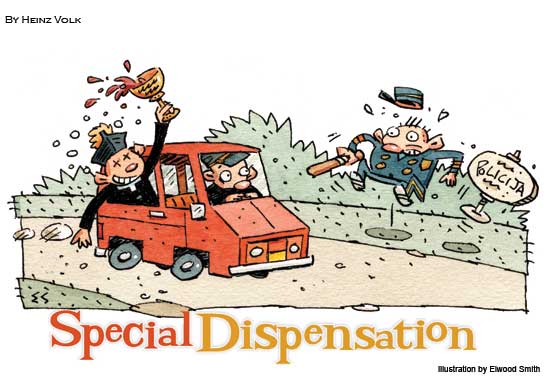Special Dispensation
Heinz Volk September/October 2008
Few people would suspect a church of trying to arrange things so that its clergy would be allowed to break a law with impunity. Yet that is arguably what is happening in Hungary.
In an effort to wean the populace off vodka and crack down on the mayhem caused by drunk drivers, Hungary's parliament recently passed zero-tolerance legislation. If a police officer administering breathalyzer tests detects even the slightest trace of alcohol in what a driver exhales, the officer can confiscate their license on the spot. Unfortunately, that would leave Roman Catholic priests high and dry, as they celebrate Mass daily and drinking sacramental wine is an integral part of the service.
The problem for the fathers is com-pounded by the fact that, due to a short-age of priests, each is responsible for the spiritual well-being of parishioners in several villages, requiring a daily circuitous commute, with more wine imbibed at each stop. Add to that the weddings, christenings, and funerals requiring a priest's presence and the possibility of liquid libations and one can readily see that few, if any, priests would be able to pass the test.
To allow its priests to continue their important ministry, the church has asked the justice minister to exempt them from this new law, adding that it would issue special cards to the priests stating that alcohol consumption is in the fulfillment of and conjunction with their official duties.
By making the appeal, the church is putting the government, as well as itself, in a precarious position. If the government grants the church's request and gives exemption to Roman Catholic priests, it could be charged with favoritism. If, on the other hand, it denies the exemption, that could be construed as a curtailment of religious freedom and state interference in the execution of the priests' religious duties.
The Bible sets high standards for priests and other clergy. They are to be role models, their lives characterized by purity and holiness. Although most of those taking holy orders are dedicated, devout individuals, the Roman Catholic priesthood has been plagued by allegations of sexual abuse by a few, and the church's coffers have been depleted in settling the resultant suits.
If priests are granted an exemption so that they can flout their country's legislation, it will surely send the wrong message to their parishioners. Respect for the clergy will be undermined, and so will respect for both secular and religious laws.
Is there a way out of the dilemma? There is, of course, a very real church-state issue here. Separation of church and state can easily run up against freedom of religion if overzealously and insensitively applied. Is there a way that priests can keep the law while at the same time continuing to fulfill their religious duties?
One obvious answer might be for them to have a chauffeur. Here in North America, having a designated driver allows people to party and imbibe yet still get home safely without endangering the lives of others. With several churches under their jurisdiction, the Hungarian priests should be able to find someone willing to drive them around, especially if the gas is paid for. The savings realized when a priest does not need to own a vehicle and be responsible for its maintenance and upkeep would probably suffice to pay for a driver.
There is perhaps a practical option of the Catholic Church taking a second look at the sacramental wine. When God gave the Israelites guidelines for their feasts, He told them to use "new wine." That is, wine that hasn't fermented yet, or pure grape juice. Admittedly, during the Middle Ages keeping wine from fermenting may have been difficult, but with Louis Pasteur's discoveries, this is no longer a problem. Pure, unfermented grape juice can be bought in any grocery store. Nonalcoholic or dealcoholized wine is just as readily available, retaining the flavor yet avoiding the intoxicating effects and breakdown of inhibitions that have led some priests into compromising situations.
Given this, it would be well for priests and other clergy to go back to the drink that God originally intended to be used in His holy feasts. That way they could keep the law and carry out their religious duties with the blessings of the state as well as a clear head and clean conscience.
Heinz Volk writes from Summerland, British Columbia, Canada.
_________________________________________
Some years ago, while editing a teen drug education journal, I attended an interfaith meeting on drug and alcohol problems. A Roman Catholic priest with expertise on his church's alcohol issues revealed that by using alcoholic wine for the Mass many priests are becoming alcoholic. An alcoholic can relapse almost immediately upon drinking again. He explained that there is a dispensation for such priests to use nonalcoholic grape juice instead. A good solution and arguably closer to the biblical ideal. Editor.